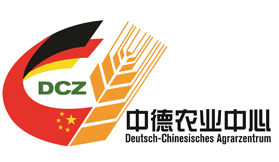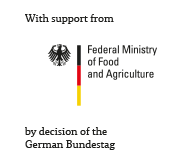F.A.Q.
Q: Why a new database?
A: At present, no content-management system aiming at specifically collecting information on bilateral German-Chinese research collaborations exists.
Q: What sets this database apart from other databases?
A: Existing databases in the field of agricultural sciences in Germany focus either on experts and institutions, but not on projects (such as the ExpertAtlas of the Deutsche Agrarforschungsallianz DAFA), or on projects and institutions, but not on experts (such as the FISA-online database). This new database, as searchable experts, projects and institutions database allows for both.
Q: How is a search carried out?
A: The database allows for separate searches for experts, projects and institutions. One can either search for keywords (inserting one, or a group of keywords), or narrow down the search by selecting “Research Areas”, “Research Activities” and “Research Disciplines”. One or more “Interdisciplinary projects” (cross-cutting issues), such as “Organic farming”, or “Tropics and Subtropics” may also be chosen.
Q: Which keywords are searchable in the database?
A: Names (first and last) of German experts; names of German institutions, English titles of joint collaboration projects. Publications inserted into the database are not searchable by their titles or abstracts, since other search engines are much more capable to do that. No names of Chinese experts, no names of Chinese institutions are searchable at the current stage of its development.
Q: How are contents inserted?
A: Experts are to insert contents by themselves. Click on the panel “Create profile” to access the Registration Form. Contents should then be inserted in the following order:
- Institution
- Expert (scientist)
- Projects
- Publications (under projects)
Q: Who is allowed to insert contents?
A: Currently, the database is limited to experts in publicly-funded institutions, such as universities, research institutions. The newly-inserted information is then verified by the database administrators, who then place the new contents online.
Q: How do I register as an expert?
A: Experts have to be affiliated to a publicly-funded institutions (no distinction is made between permanent and temporary employment). Therefore, it is recommended to start with checking whether one’s institution is already included in the list of institutions, or newly-registering the institution as first step. As second step, the expert-related information is inserted.
Q: Does registering as an expert require to be a member of a certain organization? Are any membership fees involved?
A: No, experts just have to be affiliated to a publicly-funded institutions, such as universities, research institutions (no distinction is made between permanent and temporary employment). No membership fees for single experts or for their institutions are required.
Q: When registering my institution, how do I know whether my institution is already included in the database?
A: Before registering a new institution, do a search for “Institutions”, selecting “All”, with no keywords and “All” Research Areas.
Q: When registering as an expert, how do I find my institution?
A: When creating your expert profile, click on the field “Select an Institution”: A list of institutions will appear.
Q: What if my institution is not yet on the list?
A: Click on “Cannot find your institution”: A new blank field will appear in which the Institution name is manually inserted.
Q: How can projects be included into the database?
A: Projects require information of the “Head” and “Staff” involved. It is therefore necessary to register as institution and expert first (see previous question). Thereafter, the project-related information may be added by the expert.
Q: When newly-registering a project, how do I include the “Head” of the project?
A: When inserting your project information, click on the field “Select an expert”: A list of experts will appear.
Q: What if the expert is not yet on the list?
A: Click on “Cannot find an expert”. You can then also manually add a new expert name here. However, it is recommended to add the expert’s information first, before entering the project information.
Q: Is the database limited to ongoing projects only?
A: No, both ongoing and completed projects are to be stored in the database. It is very valuable for researchers to see what work has already been carried out in that field by similar German and/or Chinese groups in the past almost 40 years.
Q: What does an asterisk * mean next to the information to be inputted?
A: An asterisk * means that it is a required field.
Q: is it possible to select Research Disciplines (x-axis) and/or Research Activities (y-axis) under different Research Areas?
A: Yes. For example, Disciplines and/or Activities may be selected under both “Crops (Plant Production)” and “Environment and Ecology”.
Q: How to proceed if my Research Discipline or Research Activity is not included under any of the Research Areas?
A: Please give a suggestion for inclusion by contacting the database administrators via the following e-mail address: info@dcz-china.org
Q: Why does the Google ReCAPTCHA field appear at the bottom of the Registration Page asking me to confirm that “I am no Robot”?
A: This is to prevent the data base becoming the victim of spammers clogging it by potentially harmful information generated by robots.
Q: Do I require a VPN (virtual private network software) to register new information and answer the Google ReCAPTCHA fields?
A: For users outside China, no VPN is required in order to reply to the Google ReCAPTCHA field.
Q: What should be done in case of questions not in this list of FAQs?
A: Please contact the database administrators via the following e-mail address: info@dcz-china.org
Q: Can information on Chinese partner institutions, researchers and projects be inserted or accessed in this database?
A: This Database presently allows for English-language searches for scientists based in Germany only. However, an inclusion of information on Chinese institutions, researchers and projects is planned. Talks between the German and Chinese responsible institutions and scientists are currently ongoing.
Q: What is the language of the database?
A: The working language of the database is English. Chinese language contents may be included at a later stage (see previous question). Information on German institutions, experts and projects should be given in English language where possible, to facilitate access by Chinese researchers.
Q: How are the security of the data, the privacy of the experts and the confidentiality of their information guaranteed?
A: This database is for research facilitation and communication purposes exclusively. The database administrators and the website company handle all data in a strictly confidential manner. Great attention is paid to server security. The database servers are hosted in Germany. There are no connections to any commercial professional networks or similar.

